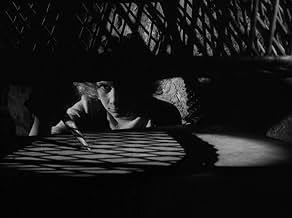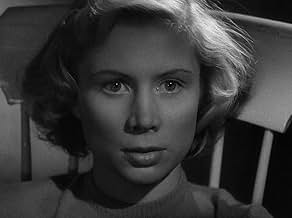VALUTAZIONE IMDb
6,7/10
2257
LA TUA VALUTAZIONE
Un regista cerca di creare il migliore film della storia, ma scopre che le capacità umane hanno i loro limiti.Un regista cerca di creare il migliore film della storia, ma scopre che le capacità umane hanno i loro limiti.Un regista cerca di creare il migliore film della storia, ma scopre che le capacità umane hanno i loro limiti.
- Regia
- Sceneggiatura
- Star
Birgit Lindkvist
- Anna
- (as Bibi Lindkvist)
John W. Björling
- Man in Birgitta's Dream
- (non citato nei titoli originali)
Sven Björling
- Filmworker at Film Studio
- (non citato nei titoli originali)
Anita Blom
- Anna
- (non citato nei titoli originali)
Britta Brunius
- Lasse's Mother
- (non citato nei titoli originali)
Åke Engfeldt
- Police Officer
- (non citato nei titoli originali)
Gösta Ericsson
- Police Officer
- (non citato nei titoli originali)
Kenne Fant
- Arne
- (non citato nei titoli originali)
Recensioni in evidenza
Bergman Collection 20 All Reached
Bergman's first scripted film at the helm, and I didn't expect it to be that good in comparison to his entire career. It's a shame that the CC compilation didn't choose to include this Bergman film, with a hint of that New Wave flavor from Monica the Delinquent. Opened the movie on b-site with the anticipation of the Mask references.
The camera reveal in Godard's Contempt has long been a novelty, and it seems Bergman is still a master of his craft.
Outstanding light shaping, which has become rare in the late Bergman, it is difficult to change the lighting team?
And actually started so early in the discussion of ghosts and gods worthy of Bergman, this step should be counted into the faith trilogy.
BIBI's awful big eyes almost ruined the movie, but I still appreciate her excellent interpretation of the surreal moments that Bergman gave her life. Those big eyes seem to sparkle as if they simply don't know where to use themselves.
The ending wraps up the theme of ghosts and gods, while the core is a human framework, perfect drama. Seal the deal.
Bergman's first scripted film at the helm, and I didn't expect it to be that good in comparison to his entire career. It's a shame that the CC compilation didn't choose to include this Bergman film, with a hint of that New Wave flavor from Monica the Delinquent. Opened the movie on b-site with the anticipation of the Mask references.
The camera reveal in Godard's Contempt has long been a novelty, and it seems Bergman is still a master of his craft.
Outstanding light shaping, which has become rare in the late Bergman, it is difficult to change the lighting team?
And actually started so early in the discussion of ghosts and gods worthy of Bergman, this step should be counted into the faith trilogy.
BIBI's awful big eyes almost ruined the movie, but I still appreciate her excellent interpretation of the surreal moments that Bergman gave her life. Those big eyes seem to sparkle as if they simply don't know where to use themselves.
The ending wraps up the theme of ghosts and gods, while the core is a human framework, perfect drama. Seal the deal.
"Prison" (1949) is the first film in which Ingmar Bergman develops something like a style of his own.
We see various elements that reappear in later movies. There is the character of death (to reappear in "The seventh seal", 1957) and dreamsequences (to reappear in "Wild strawberries", 1957).
The most important sign for things to come is however the theme of the film. The film is about a director trying to make a film about a world governed by the devil. Is a world governed by the devil not very much like a wordl where God is silent? Later Bergman would make a trilogy around this theme consisting of the films "Through a glass darkly" (1961), "Winterlight" (1963) and "The silence" (1963).
So in "Prison" Bergman started to experiment with a personal style, but this style was not fully developed yet. There are good sequences (such as the dream sequence) but as a whole the film is somewhat cluttered and inaccessible. Moreover the film in a film format about a director struggling to make a film does not work very well in "Prison". It does work very well in "8,5" (1963, Federico Fellini), but the Bergman of 1949 is not the Fellini of 1963.
We see various elements that reappear in later movies. There is the character of death (to reappear in "The seventh seal", 1957) and dreamsequences (to reappear in "Wild strawberries", 1957).
The most important sign for things to come is however the theme of the film. The film is about a director trying to make a film about a world governed by the devil. Is a world governed by the devil not very much like a wordl where God is silent? Later Bergman would make a trilogy around this theme consisting of the films "Through a glass darkly" (1961), "Winterlight" (1963) and "The silence" (1963).
So in "Prison" Bergman started to experiment with a personal style, but this style was not fully developed yet. There are good sequences (such as the dream sequence) but as a whole the film is somewhat cluttered and inaccessible. Moreover the film in a film format about a director struggling to make a film does not work very well in "Prison". It does work very well in "8,5" (1963, Federico Fellini), but the Bergman of 1949 is not the Fellini of 1963.
The real prison is in the minds of these people, and in Bergman's in particular. Bergmann was always obsessed with depression and death; it was in all his fllms. Just like violence is in every Sergio Leone film, some directors are obsessed with one emotion or another. In this one, we find supposedly talented artists are having a difficult time with life. O poor little me! Get over it. People with real talent don't get despondent, they get to work. They may get down once in a while, but they bounce back from adversity, and overcome it. These wusses do not. They expect miracles from their mediocre talents and efforts, and are disappointed when they are not recognized as geniuses or great artists. You know how many years Bogart or Streep had to struggle before they became major stars? A lot longer than these no-talents. I hate agreeing with Woody Allen, but Bergmaaaaan is a joke; a bad joke at that. At least the photography is interesting.
Bergman's first film where he wrote his own script, and had real artistic control (in exchange for a tiny budget.).
An aging film professor, just released from a mental asylum, visits an old student, now a successful director, and challenges him to make a film showing that the devil really rules the earth. While dismissive in the moment, the director is haunted by the idea, and a journalist friend suggests the film could take off from his experience interviewing a very young prostitute.
We then enter the prostitute's story, and it's (intentionally) never fully clear if what we're seeing is the film that arose from the concept, or the truth of the girl's life.
Beautifully photographed, and full of inventive touches (the main credits are spoken, not seen, over a long tracking shot of a dark cobblestone street), I was also surprised that it contained more of a dark sense of humor, about itself and the world, then most critics acknowledge. In turn, that keeps the film's occasional youthful over-obsession with despair from ever feeling unbearably sophomoric.
I will admit it lost steam for me in the last third, some of the performers aren't quite up to the heavy burdens of the script, and a few sequences are awkward and bespeak Bergman's comparative youth. But the next morning I found myself haunted by images and moments even if the whole only felt partly successful.
An aging film professor, just released from a mental asylum, visits an old student, now a successful director, and challenges him to make a film showing that the devil really rules the earth. While dismissive in the moment, the director is haunted by the idea, and a journalist friend suggests the film could take off from his experience interviewing a very young prostitute.
We then enter the prostitute's story, and it's (intentionally) never fully clear if what we're seeing is the film that arose from the concept, or the truth of the girl's life.
Beautifully photographed, and full of inventive touches (the main credits are spoken, not seen, over a long tracking shot of a dark cobblestone street), I was also surprised that it contained more of a dark sense of humor, about itself and the world, then most critics acknowledge. In turn, that keeps the film's occasional youthful over-obsession with despair from ever feeling unbearably sophomoric.
I will admit it lost steam for me in the last third, some of the performers aren't quite up to the heavy burdens of the script, and a few sequences are awkward and bespeak Bergman's comparative youth. But the next morning I found myself haunted by images and moments even if the whole only felt partly successful.
Minor, depressing early Ingmar Bergman drama, bulit on an ambitious life-mirrors-art concept that doesn't really come off. It begins with the premise of a director being pitched the idea of making a film that depicts "Hell on Earth", but then the movie seems to try to prove this thesis via the story of some people involved in the filmmaking process. There is one notable extended dream sequence, but the most original touch is probably the spoken opening credits that never actually appear on the screen. It's a well-made and well-acted film, but one recommended mostly for dedicated Bergman followers. ** out of 4.
Lo sapevi?
- QuizIngmar Bergman's first film based on his own original screenplay.
- Curiosità sui creditiThere are no opening titles in this film. An unseen narrator (Hasse Ekman) reads the credits, as well as the title, out loud approximately ten minutes in to the movie. The sole title card is the standard "Slut" (Swedish for "End") that closes the picture.
- ConnessioniEdited into Histoire(s) du cinéma: Une histoire seule (1989)
- Colonne sonoreDrömmen
Composed by Erland von Koch (1949)
I più visti
Accedi per valutare e creare un elenco di titoli salvati per ottenere consigli personalizzati
- How long is Prison?Powered by Alexa
Dettagli
Botteghino
- Budget
- 240.000 SEK (previsto)
- Tempo di esecuzione1 ora 19 minuti
- Colore
- Mix di suoni
- Proporzioni
- 1.33 : 1
Contribuisci a questa pagina
Suggerisci una modifica o aggiungi i contenuti mancanti

































